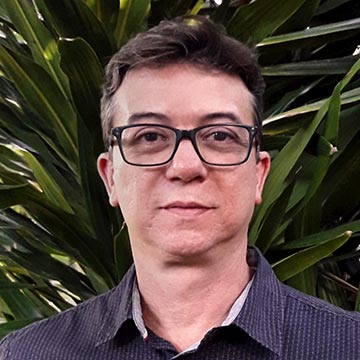23 July 2019 · Global Partnership for Zero Leprosy
Q&A: Dr. Maurico Lisboa Nobre’s dedication to the field of leprosy
Dr. Mauricio Lisboa Nobre is a physician specializing in dermatology and leprology working in Natal, and is member of the technical advisory board for Brazil’s national leprosy program. He served as the Brazilian representative on the GPZL leadership team this past year and generously gave his time and expertise to the partnership. Although Dr. Nobre is no longer serving on the leadership team, he continues to make major contributions in the leprosy field. He will oversee a new leprosy outpatient clinic at the Instituto de Medicina Tropical (Rio Grande do Norte Federal University).

How did you get started in the field of leprosy (Hansen’s disease)?
After my medical training, I moved to a small town close to the city of Natal, where I worked as a general practitioner. I began to see several cases of leprosy in my practice. My dermatological training had helped me diagnose and recognize the signs of leprosy but I was surprised to see so many cases. I sought better conditions for working with leprosy patients and shortly after I was asked to work at the state referral center in the state of Rio Grande do Norte.
Because of my interest, I went back to school to study epidemiology and the hidden prevalence of leprosy. I obtained master’s and doctoral degrees in Tropical Medicine by the Oswaldo Cruz Foundation (Rio de Janeiro). I have also worked as the Brazilian Representative for LEPRA (UK) and developed consulting for other ILEP members in Brazil (NLR and ALM) and for the Pan-American Health Organisation (PAHO).
The referral center is at a state hospital. What is your routine like and what kind of cases do you see?
I work with patients four days a week. The cases range from very early cases to late diagnoses, and involves grade 2 disabilities. I also train medical students, residents in infectology and dermatology, doctors and nurses in diagnosing and treating patients.
I also conduct field research, supported by the Rio Grande do Norte Federal University, which partners with the state referral center.
Is stigma still a critical issue?
Yes, stigma and discrimination is still here, but it has improved. People are more open to discussing the disease than they were in the past. Advocacy groups like MOHAN and our National Leprosy Program have run communications campaigns and people have more understanding about the disease. Because of the myths associated with leprosy, changing the name to Hansen’s disease, from my point of view, may have helped lessen the negativity associated with the disease.
I understand you will oversee a new leprosy outpatient clinic will be open at Rio Grande do Norte Federal University. What will the new clinic be like?
I’m very excited about the clinic. The clinic will actually serve all infectious diseases such as AIDS, leishmaniasis, tuberculosis and others. It is a new building where patients can get comprehensive treatment. It includes three components: (1) services for patients (2) teaching and training rooms for students and teachers, and (3) P1, P2 and P3 laboratories. To ensure that patients get good treatment, we will also offer services like neurology, orthopedic and ophthalmology, and diagnosis facilities though biopsy, bacilloscopy, PCR and eletroneuromiography.
Congratulations on this new opportunity. We appreciate the time you spent serving on the the Global Partnership for Zero Leprosy leadership team. What do you think is the main value of the partnership?
The partnership has a major role in pushing political commitment to fight leprosy. After the declaration that leprosy was eliminated as a public health problem, it seemed to be forgotten. Research is also important. Diagnostic tools and a vaccine could be crucial. The Research Agenda Working Group was a great step in analyzing the research and defining priorities, and my hope is the partnership can advocate for new research and new strategies for leprosy control across multiple countries.
Interviewed by Jessica Cook, Global Partnership for Zero Leprosy communications